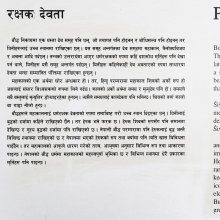Parna, Parṇa, Pārṇa: 20 definitions
Introduction:
Parna means something in Buddhism, Pali, Hinduism, Sanskrit, Marathi, Hindi, biology. If you want to know the exact meaning, history, etymology or English translation of this term then check out the descriptions on this page. Add your comment or reference to a book if you want to contribute to this summary article.
Parna has 19 English definitions available.
Images (photo gallery)
Languages of India and abroad
Sanskrit dictionary
[Deutsch Wörterbuch]
Source: Cologne Digital Sanskrit Dictionaries: Böhtlingk and Roth Grosses Petersburger WörterbuchParṇa (पर्ण):—
--- OR ---
Pārṇa (पार्ण):—(von parṇa)
1) adj. [Pāṇini’s acht Bücher 4, 2, 145.] [Scholiast] a) von Blättern erhoben (eine Abgabe) gaṇa śuṇḍikādi zu [Pāṇini’s acht Bücher 4, 3, 76.] — b) aus dem Holze der Butea frondosa gemacht: yūpa [Pañcaviṃśabrāhmaṇa 21, 4, 13.] [GOBH. 1, 7, 16. 2, 10, 8.] —
2) m. patron. gaṇa śivādi zu [Pāṇini’s acht Bücher 4, 1, 112.]
--- OR ---
Parṇa (पर्ण):—[Z. 17] füge a) nach
2) m. hinzu. —
2) b) vgl. [Oxforder Handschriften 55,a,36.]
--- OR ---
Parṇa (पर्ण):—
2) a) [Z. 7 lies] valka st. kalka .
Source: Cologne Digital Sanskrit Dictionaries: Sanskrit-Wörterbuch in kürzerer FassungParṇa (पर्ण):——
1) n. — a) Schwungfeder , Fittig , Feder überh. — b) das Gefieder eines Pfeiles. — c) Blatt. Am Ende eines adj. Comp. f. ā und ī (nur bei Pflanzennamen). — d) Betelblatt [Rājataraṃgiṇī 7,946.] —
2) m. — a) Butea frondosa. Nom.abstr. parṇatva n. [Maitrāyaṇi 4,1,1(Rs.3,5,2,1).] — b) Nomen proprium — α) eines Lehrers. — β) Pl. eines Volkes [Wilson's Uebersetzung des Viṣṇupurāṇa ,2,164.] — γ) *einer Oertlichkeit. —
3) f. parṇī — a) Gesammtname für für vier auf parṇī auslautende Pflanzen [Carakasaṃhitā 6,1.] — b) *Pistia Stratiotes. — b) *das Blatt der Asa foetida (?).
--- OR ---
Pārṇa (पार्ण):——
1) Adj. — a) *von Blättern erhoben (Abgabe). — b) aus dem Holze der Butea frondosa gemacht. —
2) *m. — a) Blätterhütte [Galano's Wörterbuch] — b) Patron.
Sanskrit, also spelled संस्कृतम् (saṃskṛtam), is an ancient language of India commonly seen as the grandmother of the Indo-European language family (even English!). Closely allied with Prakrit and Pali, Sanskrit is more exhaustive in both grammar and terms and has the most extensive collection of literature in the world, greatly surpassing its sister-languages Greek and Latin.
See also (Relevant definitions)
Starts with (+105): Parna-mriga, Parna-shashan, Parnabhaksha, Parnabhavana, Parnabhedini, Parnabhojana, Parnabhrishtaka, Parnabija, Parnabijah, Parnabji, Parnacalai, Parnacara, Parnachara, Parnachira, Parnachirapata, Parnachoraka, Parnacirapata, Parnacoraka, Parnadatta, Parnadhaka.
Ends with (+120): Acchinnaparna, Achchhinnaparna, Adhiparna, Aidasauparna, Ajaparna, Angaraparna, Ankolaparna, Aparna, Arkaparṇa, Arkkaparna, Artaparna, Asanaparna, Ashtaparna, Ashvaparna, Atisauparna, Atyamlaparna, Ayugalaparna, Ayugmaparna, Bahulaparna, Bahuparna.
Full-text (+383): Panna, Saptaparṇa, Parna-mriga, Parnabhojana, Parnakhanda, Kalaparna, Arkaparṇa, Parnakricchra, Parnam, Karaparṇa, Parnavalkya, Jirnaparna, Suraparna, Granthiparna, Dhvas, Triparṇa, Parnavalka, Parnabhedini, Parnalata, Agraparni.
Relevant text
Search found 46 books and stories containing Parna, Parṇa, Pārṇa; (plurals include: Parnas, Parṇas, Pārṇas). You can also click to the full overview containing English textual excerpts. Below are direct links for the most relevant articles:
Rig Veda (translation and commentary) (by H. H. Wilson)
Satapatha-brahmana (by Julius Eggeling)
Kāṇḍa I, adhyāya 7, brāhmaṇa 1 < [First Kāṇḍa]
Kāṇḍa XI, adhyāya 7, brāhmaṇa 2 < [Eleventh Kāṇḍa]
Kāṇḍa XI, adhyāya 1, brāhmaṇa 4 < [Eleventh Kāṇḍa]
Vakyapadiya of Bhartrihari (by K. A. Subramania Iyer)
Verse 3.7.143 < [Book 3 - Pada-kāṇḍa (7): Sādhana-samuddeśa (On the Means)]
Atharvaveda and Charaka Samhita (by Laxmi Maji)
Maṇis (medical amulets) in the Atharva Veda < [Chapter 3 - Diseases and Remedial measures (described in Atharvaveda)]
Vivekachudamani (by Shankara)
Brahma Sutras (Nimbarka commentary) (by Roma Bose)
Brahma-Sūtra 3.3.41 < [Adhikaraṇa 18 - Sūtra 41]
Brahma-Sūtra 3.4.2 (prima facie view, 2-7) < [Adhikaraṇa 1 - Sūtras 1-20]
Brahma-Sūtra 1.1.14 < [Adhikaraṇa 6 - Sūtras 13-20]

